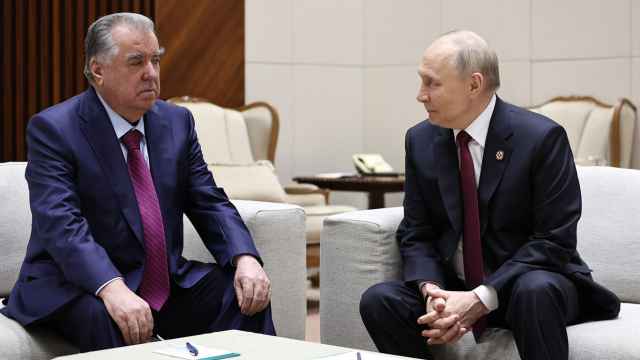The Kremlin is taking a step toward reducing the number of prisoners, drafting a bill to ease punishments on crimes ranging from libel to smuggling and kidnapping.
But judicial experts are unimpressed with the bill, which some called the work of incompetent officials with little knowledge of actual laws or legal practice.
The bill, co-authored by the Justice Ministry, is the third set of legal amendments drafted after President Dmitry Medvedev initiated a campaign last year to make criminal legislation more humane.
The detention of white-collar crime suspects was banned last April, and minimal prison sentences were canceled for 68 criminal offenses — among them fraud, theft and robbery — earlier this month.
The new bill is to be submitted to the State Duma by the end of this month, a senior Duma source told Gazeta.ru on Tuesday.
The issue is, indeed, pressing because official statistics indicate that prison does not mend the ways of criminals. Of the 820,000 inmates held in prisons nationwide in 2009 — the latest year for which the Federal Prison Service has released data — more than a third have served time previously.
Moreover, the number of repeat offenders among the prison population grew by 6 percent to 30.6 percent from 2003 to 2009, according to the Supreme Court's statistics.
Fines and Forced Labor
The new 83-page bill, a copy of which was obtained by The Moscow Times, proposes abolishing prison terms for certain crimes or replacing them with alternative punishments.
First-time convicts for economic crimes will not be jailed if they pay back six times the amount of damage they have caused, the bill says.
People convicted of minor crimes and first-time felonies may get off with fines, house arrest or forced labor instead of prison.
A number of offenses, including libel, insult, discrimination and illegal trafficking of consumer goods, will be decriminalized by making them punishable with fines, not prison terms. Kidnapping would be punishable by fines along with prison terms but not decriminalized.
The draft also proposes postponing sentences for drug users, who would be allowed to undergo treatment before going to jail.
The bill steps up considerably the authority of judges, who would decide at their own discretion whether to replace imprisonment with forced labor for certain crimes.
A judge would also be allowed to downgrade the gravity of a crime — leading to a softer penalty — in cases where the evidence favors a suspect.
A Kremlin spokesman refused to comment on the bill. An inquiry submitted to the Justice Ministry last Thursday was not answered by Tuesday.
A note attached to the bill says the Federal Security Service opposes the decriminalization of illegal trafficking of consumer goods, but the FSB has issued no comment on the issue.
Constitutional Court aide Oleg Vagin, in a statement, criticized the proposal to grant judges the right to reduce gravity of crimes. But a court spokeswoman said the court has made no official statements on the matter. Vagin, who also slammed the Kremlin's ongoing police reform, could not be reached for comment.
'Criminal Nightmare'
Independent analysts contacted by The Moscow Times criticized many of the bill's proposals.
"My overall impression is that the draft was done by dilettantes who have no clue about criminal legislation," criminal lawyer Mikhail Kleimyonov said in e-mailed comments.
Viktor Luneyev, a crime researcher with 50 years of experience, said in e-mailed comments that the bill could have been "fudged up by uneducated people who are unaware of the real crime in the country."
The bill ought to have been based on "fundamental analysis" of crime in Russia, but the country lacks qualified experts and statistical data for the purpose, Luneyev said.
Criminal lawyer Semyon Lebedev said most of the bill's proposals, coupled with the Kremlin's previous initiatives and "unaccomplished" police reforms, would land the country in a "criminal nightmare."
Lebedev opposed granting the judge the power to decide on the punishment, citing rampant corruption. "In current circumstances, any extension of the judge's powers is a pro-corruption factor," Lebedev said in a telephone interview.
Instead, the criminal legislation should be made "as detailed as possible," clearly establishing types of punishments for various crimes, he said.
His stance was echoed by Kleimyonov who said an extension of a judge's powers contradicted recent anti-corruption legislation aimed at giving officials less, not more, say in how to apply laws.
But lawyers Vladimir Ovchinsky and Yury Golik, as well as Lebedev, praised the proposal to replace prison time with recompensation for economic crimes.
Lebedev supported the idea of alternative punishments, saying many people "ended up in prison only because the work of all Russian law enforcement agencies is aimed at putting a person in prison."
Ovchinsky also backed the abolishment of prison terms for people convicted of minor crimes, saying "only people who pose danger to society should be sent to jail."
Decriminalization
Most decriminalization proposals were also met with criticism. The decriminalization of the illegal trafficking of consumer goods will de-facto legalize smuggling, leading to the market being flooded with substandard and outright dangerous goods, said Ovchinsky, who quit as adviser to Constitutional Court Chairman Valery Zorkin in mid-March after his criticism of the bill angered the Kremlin.
The proposal resulted from "lobbying on the part of big trafficking chains," said Golik, an organized crime expert with the Russian State University of Trade and Economy.
"A fine of 2 [million] to 3 million rubles is a trifle when the traffic's cost is 500 million rubles," Golik said, referring to newly proposed punishments for smugglers.
"Authorities want to buy off criminal businessmen ahead of the elections," crime researcher Luneyev said in a reference to the State Duma vote in December and the presidential race of 2012.
Golik was also skeptical of the idea to decriminalize libel and insults, saying it would provoke new smear campaigns. The threat of criminal prosecution has served as a "mark of shame" that has "held back" liars and slanderers, he said.
As for the decriminalization of discrimination — officially "the violation of the equality of rights and freedoms of a citizen" — it simply contradicts a number of international rights agreements ratified by Russia, criminal lawyer Kleimyonov said.
Ovchinsky spoke in favor of reintroducing the forced confiscation of property — canceled in 2003 — as a criminal punishment instead of fines. Supreme Court statistics show 80 percent of people sentenced to fines simply do not pay them, he said.
He said defendants who were sentenced to fines but did not pay them should be jailed — a provision not envisioned in the bill.
Luneyev pointed out that the Criminal Code spells out 12 types of punishment, including correctional labor, supervised release and even compulsory army service, but only imprisonment and fines are actively applied because the legislation is not clear on the rest. The new bill does nothing to clarify this.
A Message from The Moscow Times:
Dear readers,
We are facing unprecedented challenges. Russia's Prosecutor General's Office has designated The Moscow Times as an "undesirable" organization, criminalizing our work and putting our staff at risk of prosecution. This follows our earlier unjust labeling as a "foreign agent."
These actions are direct attempts to silence independent journalism in Russia. The authorities claim our work "discredits the decisions of the Russian leadership." We see things differently: we strive to provide accurate, unbiased reporting on Russia.
We, the journalists of The Moscow Times, refuse to be silenced. But to continue our work, we need your help.
Your support, no matter how small, makes a world of difference. If you can, please support us monthly starting from just $2. It's quick to set up, and every contribution makes a significant impact.
By supporting The Moscow Times, you're defending open, independent journalism in the face of repression. Thank you for standing with us.
Remind me later.





